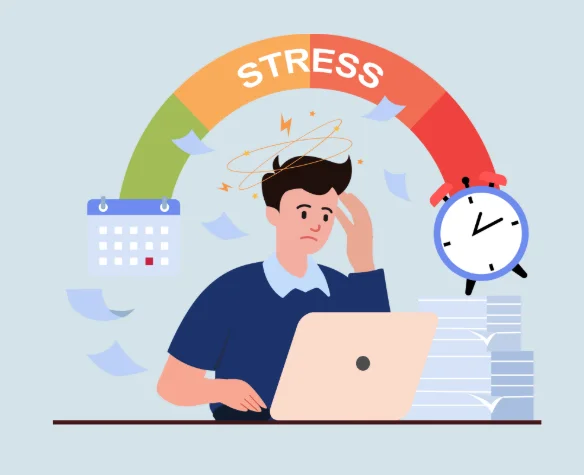Strategies for Building Resilience in the Workplace
By Hannah Hauser

By Hannah Hauser

From high workloads to demanding deadlines and eager clients, our place of work can often be the #1 source of a lot of our stress. After some time, this stress can lead to mental health problems such as anxiety, depression, burnout, and low ambition. However, workplace stress does not have to become debilitating. With some meaningful strategies, you can learn to cope with your job's stress and build resilience, lessening the impact of stress over time. What's great is that you can easily apply these practical tips and insights to your everyday life, helping you to deal with stressors and keep your mental health in the workplace.
Let's talk about some of the strategies you can use to help build up your resilience to workplace stress, as well as how to cope with it when it becomes just a bit too much. Here is a quick peek into the most effective ones, which we will define even further throughout the article:
Mindfulness is the practice of paying attention to the present moment without judgment or distraction. Mindfulness can help you calm your nervous system, regulate your emotions, and focus your attention. You can practice mindfulness by doing meditation, breathing exercises, or mindful activities such as walking, eating, or listening to music.
Deep breathing exercises are simple yet powerful ways to relieve stress, anxiety, and even frustration. When you take deep, controlled breaths, you simultaneously lower your heart rate, decrease blood pressure, and reduce tension in your muscles. You can practice deep breathing by inhaling slowly and deeply through your nose, filling your lungs and abdomen, and exhaling slowly and completely through your mouth.
Another strategy that stands out is time management. This refers to the skill of planning and organizing your tasks in terms of priority, ability to finish, and overall time consumption. With better time management, you can reduce your workload, meet deadlines, and ultimately lower your stress.
So, how do you achieve better time management? Start by setting achievable goals, prioritising your tasks in terms of importance, and delegating your responsibilities when possible. In addition to avoiding procrastination and practicing time management, ensure that you are also taking regular breaks to reduce the risk of burnout.

One way to deal with workplace stress and build resilience is to seek support from different sources. A support network can help you:
Seeking support means reaching out to others who can offer you emotional, practical, or professional assistance. Some examples of these individuals are colleagues, supervisors, family and friends, and even mental health professionals. By reaching out to the people in your life, you will release some of the built-up stress in your body, helping you to feel calmer and more at ease.
Setting boundaries is one of the most important ways to increase resilience to stress. Doing so protects your mental well-being and personal time, helping you avoid overworking yourself, reducing anger and fatigue, and enhancing your work-life balance.
You can establish limits in various aspects of your work, such as work-related duties and roles, communication, and relationships. You can prioritise your duties by urgency and importance for work-related duties and roles and delegate or contract out when possible. You can also decline unrealistic or impractical requests.
For communication, you can control how frequent and available you are and use appropriate channels and methods of communication. Responding to messages and calls promptly and courteously can also help you establish limits with workrelated communication.
Developing adaptive coping strategies is another vital strategy for building resilience and coping with workplace stress. Developing adaptive coping strategies means finding positive and constructive ways to deal with stress and adversity rather than negative and destructive ones. Some of the adaptive coping strategies that you can develop are:
It's not only about learning what skills and strategies to learn. It is equally important to learn to develop them so that you can implement them into your routine. Some ways you can develop these strategies are by being open-minded, curious, proactive, and seeking feedback and opportunities.

Building resilience and coping with workplace stress is not only the responsibility of the employee but also the employer. Some workers may think they have no choice but to cope with the pressure of their job, but there are actually various methods a workplace can use to lower stress and promote better mental well-being for their workers.
For organisations and businesses looking for ways to cultivate a resilient workforce, providing employee assistance programs should be at the top of the list. While these programs will often cost the company money, they will increase morale around the office as it supports the mental and physical health of the employees. Among these programs may be counseling opportunities, skill coaching/training, gym memberships, free health screens, and much, much more! With these programs, employees are able to better care for themselves, helping to reduce stress and promote a healthier work environment.
Recognition and appreciation are expressions of gratitude and acknowledgment for employees' contributions and achievements. They can include praise, feedback, rewards, incentives, and other forms of recognition. Organisations can encourage recognition and appreciation to help their employees feel valued and motivated.
One way to lower stress levels at work is to use suggestion boxes. These boxes allow employees to express their views, ideas, and stressors, helping employers understand what causes stress in their organisation and how to solve them.
Suggestion boxes have many advantages for lowering workplace stress. They encourage open communication, assist in finding out the reasons for stress, and increase employee involvement. Suggestion boxes offer employees a safe and confidential way to communicate their feelings and issues, building trust and honesty in the workplace.
When employers listen to employee feedback and respond to their issues, it shows that they care about employee well-being, enhance engagement, and improve morale. In summary, suggestion boxes can be a useful method for employers who want to lower workplace stress and create a healthy and productive work environment.
Note: Many workplaces will set up suggestion boxes but never follow through on the suggestions. In order to effectively reduce stress around the office, employers must implement a suggestion box and consciously go through each suggestion given.
Workplace stress is a common and pervasive issue that affects millions of professionals worldwide. However, with the right tools and strategies, you can lower your job stress's impact on you and your body.
If you're seeking ways to cope with work stress and build resilience, integrating Xono's full Wellbeing Framework into your daily routine can be a game-changer. Xono offers a comprehensive approach tailored to address the multifaceted challenges of modern work environments, equipping you with a platform where you can manage your own customized wellbeing strategy. Don't let workplace stress hold you back. Take control of your wellbeing journey today with Xono!
Ready to see how Xono can transform your workplace? Book a demo now to explore our powerful features and start your journey towards a healthier work-life balance.
Sources:
https://www.apa.org/topics/resilience
https://www.mayoclinic.org/healthy-lifestyle/stress-management/in-depth/stress-management/art-20044151
